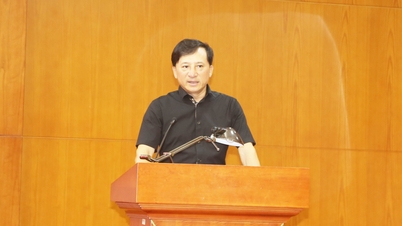Vietnam is in its fifth year of implementing the National Digital Transformation Program. In the past four years, the first year was to launch digital transformation, the second year was to conduct a general digital transformation exercise during Covid-19, the third year was to build national digital platforms, and the fourth year focused on developing digital data.
To give readers more perspectives on Vietnam's digital transformation journey, VietNamNet recently had an interview with Dr. Guy Diedrich - Senior Vice President, Global Innovation Director of Cisco and Mr. Jason Kalai, Acting General Director of Cisco Vietnam, Cambodia and Laos.

According to your assessment, what has Vietnam done after more than 4 years of implementing the national digital transformation program?
Mr. Jason Kalai: Vietnam is making great strides in all three pillars of its digital transformation journey - digital government, digital economy and digital society. This is a clear testament to the success of the country's digital transformation plans.
It can be seen that there has been a significant change in the application of digital technology to promote economic growth, take advantage of digital data and smart connectivity. In recent years, we have also witnessed the increasing role of technology in the lives of Vietnamese people.
Some people say that raising awareness about digital transformation is one of the things that Vietnam has done well in recent times. Could you please share your views on this assessment?
Dr. Guy Diedrich: I think that Vietnam is one of the countries with good awareness of digital transformation in daily life, from government levels to the majority of people, a huge advantage on the journey of national digital transformation.
Digital transformation has been receiving attention from the government with many related decisions and policies, typically the "National Digital Transformation Program to 2025, with a vision to 2030" issued in 2020; or the "Information and Communications Infrastructure Planning for the 2021-2030 period, with a vision to 2050" signed in early 2024.
On the business side, Vietnam has business leaders with progressive thinking, ready to act in digital transformation and a young workforce that adapts quickly to technology and innovation.
Besides the initial results, what are the challenges that Vietnam faces in realizing its vision of becoming a digital nation?
Dr. Guy Diedrich: Vietnam is facing what every other country in the world has faced, which is a skills gap. There are too many jobs that require skills, and Vietnam needs to rapidly upgrade the capacity of its workforce to be able to do those jobs.

The advice I give to the world leaders we work with in 50 countries is don’t just invest in technology. Because if you only invest in technology without investing in skills training for the workforce, Vietnam will miss out on a lot of opportunities.
Vietnam needs people who understand how to use technology, maintain it, manage it and benefit from it. If people do not have the skills, they will not be able to do it. Improving capacity and skills will also create more jobs for the next generation, thereby opening up a promising future with a significant contribution to GDP growth.
I would like to emphasize once again that filling the capacity gap is one of the key tasks when a country wants to carry out digital transformation.
Cisco has just announced the National Digital Transformation Acceleration Program – CDA in Vietnam. So what specific tasks will be focused on in the coming time, sirs?
Dr. Guy Diedrich: Deploying CDA in Vietnam is our way of demonstrating our vision and commitment to supporting agencies, organizations and businesses in Vietnam in their digital transformation journey. Ensuring compliance with the "National Digital Transformation Program to 2025 and Vision to 2030" of the Vietnamese Government , CDA in Vietnam is oriented to achieve the goal of improving the country's technological capacity, through important initiatives, focusing on 3 main pillars: Digital transformation in national infrastructure, digital transformation in enterprises, digital transformation in the public sector.
With digital transformation in national infrastructure, we will work with local service providers to jointly develop 5G, while equipping them with the necessary skills and best practices in network development and innovation. 5G is a key infrastructure in Vietnam’s digital transformation program, and its development will enhance data transmission, boost business productivity and improve community connectivity.
In terms of digital transformation in enterprises, we will focus on equipping the financial services and manufacturing industries with leading technology, and invest in co-developing advanced digital solutions to promote digital transformation across the industry. This will enhance the competitiveness of Vietnam’s financial services and manufacturing industries, thereby promoting economic growth.
In the public sector digital transformation, we will work with public agencies to enhance Vietnam’s national digital infrastructure. Initiatives under this pillar will support the establishment of digital government, improve urban management and promote more inclusive community development.
Mr. Jason Kalai: Vietnam’s digital economy has been growing positively in recent years, with digital interactions and cloud-first models quickly becoming the norm for businesses across the country. This, coupled with the Government’s national digital transformation plan, makes now a ripe time for public-private partnerships to strongly advance the country’s digital transformation agenda.
Going forward, we will work with stakeholders such as the Government, industry leaders, and academia to jointly develop and innovate cutting-edge solutions and provide beneficial services across the three pillars mentioned above.
Thanks both of you!

Source: https://vietnamnet.vn/viet-nam-dang-co-nhung-buoc-tien-vuot-bac-tren-hanh-trinh-chuyen-doi-so-2300752.html


![[Photo] Prime Minister Pham Minh Chinh chairs the sixth meeting of the Red River Delta Coordination Council](https://vphoto.vietnam.vn/thumb/1200x675/vietnam/resource/IMAGE/2025/9/20/310e73a867174433b2c489ec309c9063)

![[Photo] Secret Garden will appear in Nhan Dan Newspaper's Good Morning Vietnam 2025 project](https://vphoto.vietnam.vn/thumb/1200x675/vietnam/resource/IMAGE/2025/9/19/cec307f0cfdd4836b1b36954efe35a79)


































![[Photo] Spreading Vietnamese culture to Russian children](https://vphoto.vietnam.vn/thumb/1200x675/vietnam/resource/IMAGE/2025/9/19/0c3a3a23fc544b9c9b67f4e243f1e165)























![[VIDEO] 50 years of Petrovietnam: Keeping the legacy alive, creating national energy](https://vphoto.vietnam.vn/thumb/402x226/vietnam/resource/IMAGE/2025/9/20/dff4ddb3d15a4076ba5f67fcdc6c7189)












































Comment (0)